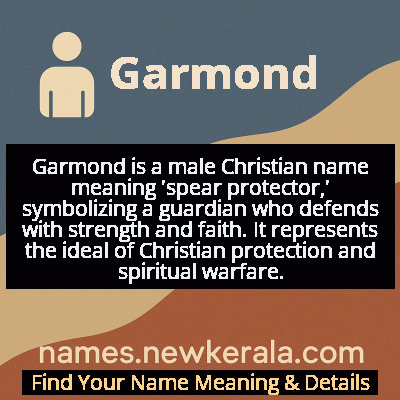Garmond Name Meaning & Details
Origin, Popularity, Numerology Analysis & Name Meaning of Garmond
Discover the origin, meaning, and cultural significance of the name GARMOND. Delve into its historical roots and explore the lasting impact it has had on communities and traditions.
Name
Garmond
Gender
Male
Origin
Christian
Lucky Number
9
Meaning of the Name - Garmond
Garmond is a male Christian name meaning 'spear protector,' symbolizing a guardian who defends with strength and faith. It represents the ideal of Christian protection and spiritual warfare.
Garmond - Complete Numerology Analysis
Your Numerology Number
Based on Pythagorean Numerology System
Ruling Planet
Mars
Positive Nature
Generous, passionate, energetic, and humanitarian.
Negative Traits
Impulsive, impatient, moody, and can be overly emotional.
Lucky Colours
Red, maroon, scarlet.
Lucky Days
Tuesday.
Lucky Stones
Red coral, garnet.
Harmony Numbers
1, 2, 3, 6.
Best Suited Professions
Military, sports, philanthropy, leadership roles.
What People Like About You
Courage, energy, leadership, generosity.
Famous People Named Garmond
Garmond of Savoy
Religious Leader
Bishop of Lausanne known for his diplomatic missions and church reforms
Garmond de Pins
Knight
Crusader knight who served in the Holy Land and helped establish Christian strongholds
Garmond de Saint-Amand
Monk and Scholar
Benedictine monk who transcribed religious manuscripts and established a monastic school
Garmond de Vienne
Nobleman
French noble who protected Christian pilgrims traveling to Santiago de Compostela
Name Variations & International Equivalents
Click on blue names to explore their detailed meanings. Gray names with will be available soon.
Cultural & Historical Significance
The name's association with spear protection made it appealing to families who valued both military prowess and religious devotion, creating a cultural legacy that spanned several centuries of European Christian history. During the Renaissance, the name gradually declined in popularity but maintained a presence in certain aristocratic families and religious orders. Its cultural significance lies in representing the medieval Christian ideal of the miles Christi (soldier of Christ), blending martial virtue with spiritual commitment in a way that resonated deeply with the cultural values of the time.
Extended Personality Analysis
Individuals named Garmond are typically perceived as protective, steadfast, and principled, with a strong sense of duty and responsibility. They often exhibit natural leadership qualities and a willingness to defend others, particularly those who are vulnerable or in need of protection. This protective nature extends beyond physical safety to include emotional and moral support, making them reliable friends and family members who can be counted on during difficult times.
Garmonds tend to be strategic thinkers who approach challenges with careful planning and determination, much like a skilled warrior assessing a battlefield. They value tradition and honor, often maintaining strong connections to their heritage and cultural roots while demonstrating resilience in the face of adversity. Their combination of strength and compassion makes them effective in roles that require both authority and empathy, and they often excel in professions where they can serve as protectors or guides for others. While they may appear reserved initially, Garmonds typically form deep, lasting relationships built on mutual trust and respect.
Modern Usage & Popularity
In contemporary times, Garmond remains a rare but meaningful choice, primarily used by families with European heritage or those seeking a name with historical Christian significance. While it never achieved widespread popularity, it has seen occasional revivals among parents interested in medieval names or those looking for unique alternatives to more common names like Raymond or Edmund. The name maintains a niche presence in countries like France, Switzerland, and parts of Germany, where its historical roots are most recognized. In recent years, there has been a slight increase in usage among families valuing traditional, strong-sounding names with clear protective connotations, though it remains outside the top 1000 names in most English-speaking countries. Its rarity makes it an appealing choice for parents seeking a distinctive name with deep historical and spiritual meaning.
Symbolic & Spiritual Meanings
Symbolically, Garmond represents the concept of divine protection and spiritual warfare within Christian tradition. The spear symbolizes both offensive capability against evil and defensive protection of the faithful, making the name emblematic of the Christian soldier archetype. It conveys the idea of standing guard over one's beliefs, family, and community while being prepared to confront challenges with courage and faith. The protective aspect extends metaphorically to representing guardianship of moral values, truth, and righteousness, suggesting someone who serves as a bulwark against corruption and injustice. In a broader sense, Garmond symbolizes the balance between strength and compassion—the ability to wield power responsibly while maintaining a protective, caring nature toward others, embodying the ideal of the strong protector who uses their strength for the benefit of the vulnerable.

